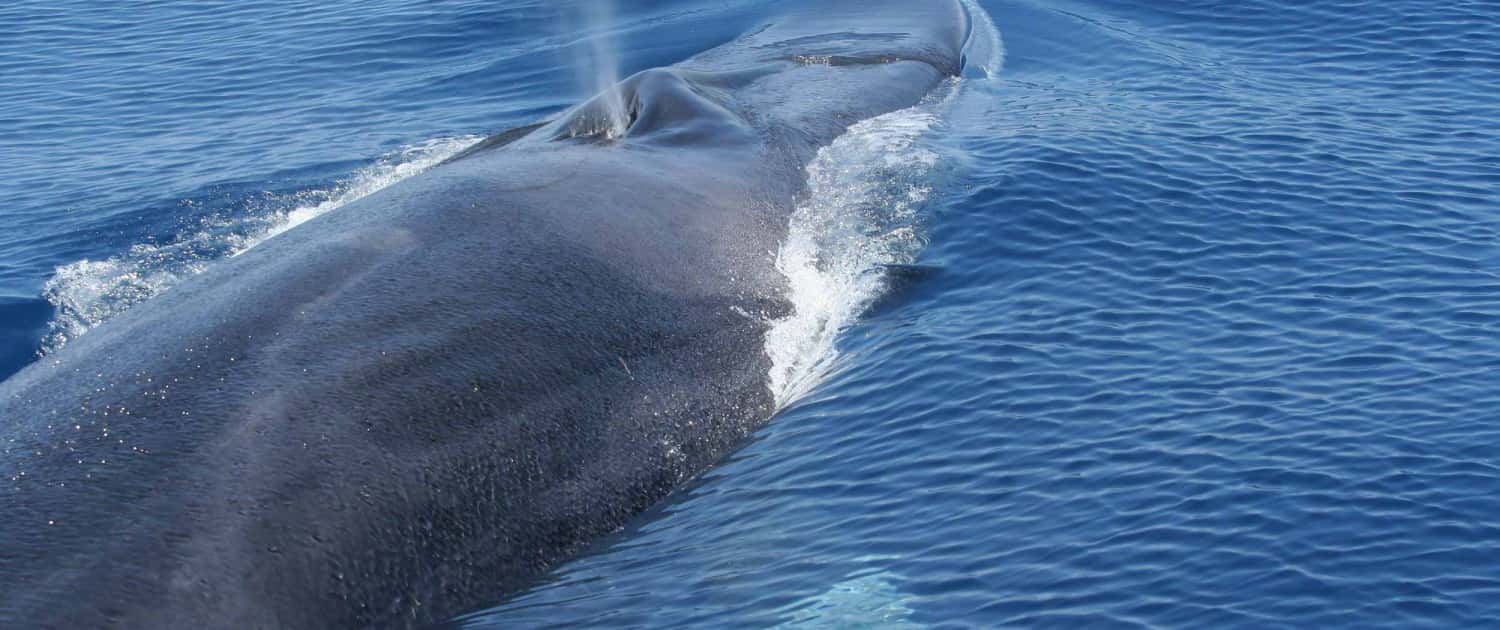Fin whales, the second largest animal on the planet after blue whales, are represented in the Mediterranean by a resident population separated from the Atlantic. Fin whales have been one of the main focus of Tethys’ field investigations since the beginning of the Institute’s activities. (Notarbartolo 2003). Main results included:
population size: one of the earliest line transect cetacean survey in the Mediterranean revealed the presence of >900 fin whales in the Pelagos Sanctuary in 1992 (Forcada et al. 1995);
population identity: genetic analyses performed on minute skin samples remotely collected conclusively indicated that Ligurian Sea fin whales are genetically different from their North Atlantic conspecifics (Bérubé et al. 1998);
presence, seasonality, and site fidelity assessment through a photo-ID catalogue of >300 individual whales frequenting the Pelagos Sanctuary. Whales were resighted in different years with a maximum interval of 17 years; within-season re-sightings indicated that at least some whales spend the entire summer in their Ligurian Sea feeding grounds (Zanardelli et al. 1999);
diving behaviour through the application by means of suction cups of velocity time-depth-recorders. Depths of at least 470 m were registered, providing evidence of deep diving performances by fin whales in the Mediterranean Sea, never directly recorded for any other species of baleen whales elsewhere (Panigada et al. 1999);
short-term responses to approaching vessels in the Pelagos Sanctuary, described through passive plotting of the whales’ tracks with laser range-finder binoculars. Avoidance strategies were observed under disturbance: travel at increased speed, reduction of the time spent at the surface, and switching from supposed feeding behaviour to travelling (Jahoda et al. 2003);
identification of foraging habitat in the Pelagos Sanctuary through the analysis of whale surface tracks (using vessel tracks as proxy for whale movements) in relation to fixed topographic and mobile remote-sensed hydrographic features. Foraging behaviour and location were inferred from characteristic swimming patterns, defined by velocity and index of linearity (Jahoda et al. 2011);
migration patterns, movements and fine-scale habitat use through satellite telemetry experiments conducted in the Pelagos Sanctuary (1992: eight whales) and in the Sicily Strait (2013 and 2015: five whales). See dedicated page
Literature
Notarbartolo di Sciara G., Zanardelli M., Jahoda M., Panigada S., Airoldi S. 2003. The fin whale, Balaenoptera physalus (L. 1758), in the Mediterranean Sea. Mammal Review 33(2):105-150. doi:10.1046/j.1365-2907.2003.00005.x
Forcada J., Notarbartolo di Sciara G., Fabbri F. 1995. Abundance of fin whales and striped dolphins summering in the Corso-Ligurian Basin. Mammalia 59(1):127-140.
Bérubé M., Aguilar A., Dendanto D., Larsen F., Notarbartolo di Sciara G., Sears R., Sigurjonsson J., Urban J., Palsbøll P.J. 1998. Population genetic structure of North Atlantic, Mediterranean Sea and Sea of Cortez fin whales, Balaenoptera physalus (Linnaeus 1758): analysis of mitochondrial and nuclear loci. Molecular Ecology 7(5):585-599.
Zanardelli M., Panigada S., Airoldi S., Borsani J.F., Jahoda M., Lauriano G., Notarbartolo di Sciara G. 1999. Site fidelity, seasonal residence and sex ratio of fin whales (Balaenoptera physalus) in the Ligurian Sea feeding ground. European Research on Cetaceans 12:124.
Panigada S., Zanardelli M., Canese S., Jahoda M. 1999. How deep can baleen whales dive? Marine Ecology Progress Series 187:309-311.
Jahoda M., Lafortuna C.L., Biassoni N., Almirante C., Azzellino A., Panigada S., Zanardelli M., Notarbartolo di Sciara G. 2003. Mediterranean fin whale’s (Balaenoptera physalus) response to small vessels and biopsy sampling assessed through passive tracking and timing of respiration. Marine Mammal Science 19(1):96-110.
Jahoda M., Azzellino A., Lanfredi C., Panigada S., Scuderi A., Zanardelli M., Airoldi S. 2011. Spatial and temporal variability of Mediterranean fin whale feeding areas in the Pelagos Sanctuary. European Research on Cetaceans 25: 245.


